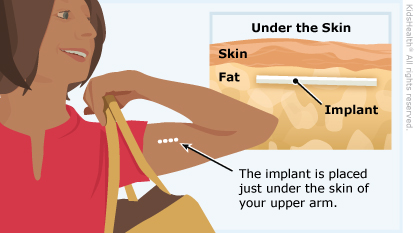Birth Control: The Implant
A birth control implant contains hormones that prevent pregnancy. When used correctly, it is a reliable form of birth control.


-
It's important to use a condom every time you have sex (vaginal, oral, or anal), even when you have an implant, because:
-
Depending on where you were in your period cycle when you have the implant put in, it might not work as birth control right away.
-
Condoms protect you from sexually transmitted diseases (STDs, also called STIs or sexually transmitted infections).
-
Using condoms while on the patch makes it even less likely that you will get pregnant.
-
You can go back to school or work right after the implant is put in.
-
Take the bandage off tomorrow morning. When the bandage is off, you may take a bath or shower.
-
The paper stitches (brand name Steri-Strips™) usually fall off by themselves in 1–2 weeks. If they are still on after 2 weeks, gently pull them off.
-
If your arm is sore where the implant was put in, and your health care provider says it's OK, you can take acetaminophen (such as Tylenol® or a store brand) or ibuprofen (such as Advil®, Motrin®, or a store brand). Follow the directions on the label for how much to take and how often.
-
Don't smoke. Smoking puts you at risk for serious side effects from the implant and many other medical conditions. If you need help quitting, go to teen.smokefree.gov or call 800-QUIT-NOW (800-784-8669).
Follow Up
-
Schedule a follow-up visit to see your health care provider 6 weeks after you get the implant.
-
Have the implant removed after 3–4 years. The health care provider can place a new implant when taking out the old one.

-
The implant area is red or swollen for longer than 2 weeks.
-
You have cramping, spotting, or irregular bleeding that continues after 6 weeks with the implant.
-
You have heavy bleeding (soaking through a pad or tampon every hour for more than 2 hours).
-
Your mood is affected by the implant.
-
You have signs of an STD (such as belly pain, fever, abnormal discharge, pain when peeing or having sex, or genital warts or sores), or if you had sex without a condom and are worried you could have an STD.
-
You start any new medicines, including antibiotics and herbal or natural medicines. Some can make the implant not work.
-
Your skin or eyes look yellow, which can be signs of liver problems (a very rare side effect of the implant).

You have lower leg pain, chest pain, trouble breathing, weakness, tingling, trouble speaking, or vision problems. These can be signs of a blood clot, which is an extremely rare side effect of the hormones in the implant.

How does an implant prevent pregnancy? The implant:
How long does an implant work? An implant works for about 3–4 years. If someone wants to get pregnant before the 3–4 years are up, a health care provider can easily remove the implant.
What if I have sex before the implant is working and I don't use a condom or it breaks? Emergency contraceptive ("morning after") pills are available at the pharmacy without a prescription or ID. They delay ovulation (the release of an egg). This way there is no egg for the sperm to fertilize. If the egg was already fertilized and implanted in the uterus wall, emergency contraceptive pills will not stop the pregnancy.
What are the side effects of the implant? The most common side effects are:
-
irregular or no periods
-
cramping during periods
-
nausea, headaches, dizziness, or breast tenderness
-
mood changes such as nervousness or sadness